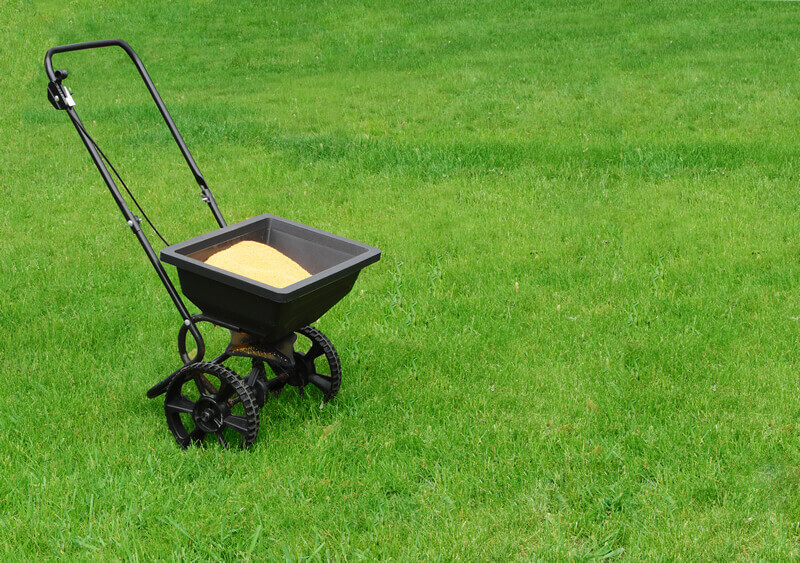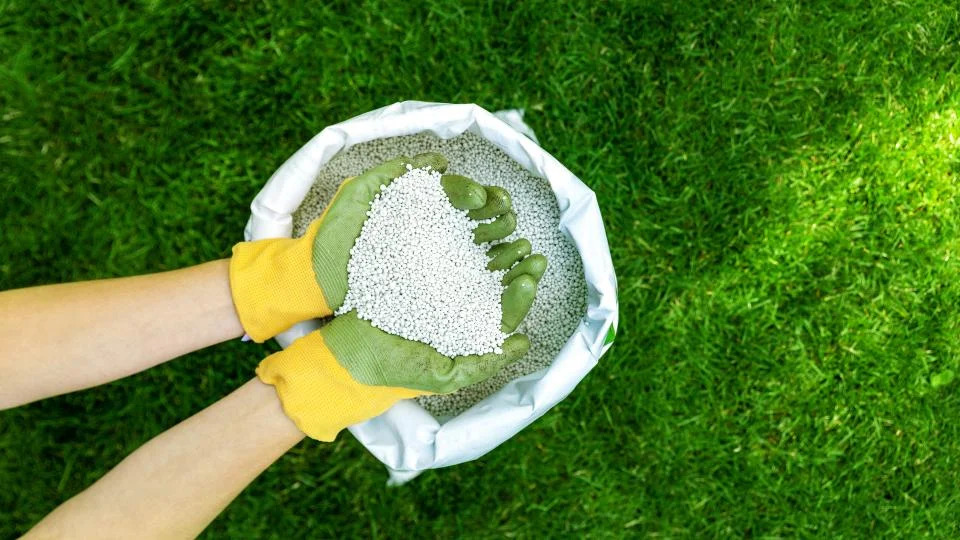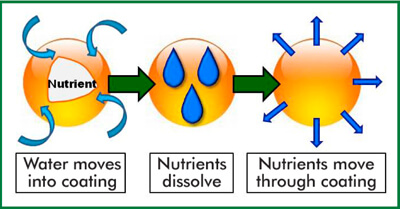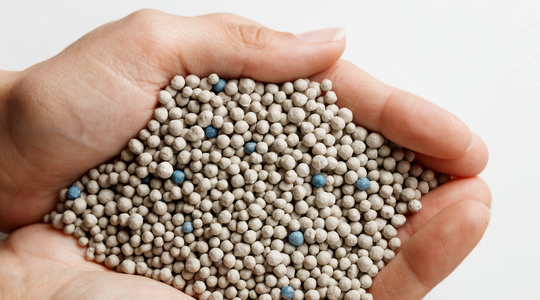Why do I need to feed my lawn?
- Growing grass is like growing any other ‘crop’, if it isn’t receiving the right lawn food regularly, the crop will be poor quality
- Plants that are not receiving the correct nutrition are more likely to suffer from diseases
- Lawns with poor nutrition will struggle with more weed and moss problems
- The right balance of lawn food will improve health, colour, and vigour of your turf
Getting the nutrition of your lawn right is a relatively complex thing. It’s not as easy as most people think. Sprinkling Miracle Grow onto the grass simply isn’t enough.
What is lawn fertiliser?
What food is best for my lawn?
When should I feed my lawn?
How much lawn feed should I use?
If so, read on…
Lawn feed briefly explained…
- Lawn fertiliser is a blend of the major nutrients Nitrogen, Phosphorus and Potassium
- Other nutrients such as Calcium, Magnesium, Boron, Iron and Manganese are also needed
- Nutrients are used up by the plant as it grows
- The nutritional requirements of your lawn changes throughout the year
- To be healthy and disease resistant, lawns need the right specialist plant food throughout the whole year – every year. Yes, even in winter!

Professional products mean better results
What is lawn fertiliser?
In simple terms, lawn fertiliser is the food or nutrition that we provide to turf to ensure that it remains as green, healthy and disease free as possible. It contains a complex blend of a number of elements, each of which has a specific role to play in the overall function of the grass plant. These elements are blended together by lawncare professionals to ensure your lawn is receiving exactly what it needs, when it needs it. From the first signs of spring, right through to the winter.
Is all lawn feed the same?
Absolutely not. There is a huge difference between lawn fertilisers. The first thing to consider is the nutritional blend. What elements the feed holds and in what proportion is critical. Next is the source of that nutrition. For example, whether it is made from minerals or derived from plant-based products. Finally, how it is applied and how long it will last. Just because something has a high price on the shelf doesn’t mean its best for feeding your lawn.
How often should I feed my lawn?
Grass plants use up nutrition as they grow. A regular application of nutrition is needed for healthy grass. Unless the correct nutrition is provided, lawns will not reach their full potential and will be more susceptible to diseases and pest attack. How often you feed your lawn will depend on its nutritional needs. This is influenced by the type of grasses growing in your lawn, and the type of soil it is growing in. Fast acting nutrition like Miracle Grow or other ‘quick green-up’ products release a lot of nutrition into the soil at once. If this is not used up it can escape through the soil into water courses. Or evaporate as a gas into the air. For the best lawn your need lawn feed that provides a complete and slow release of nutrition, gradually as your grass plants need it. Not in excess where it can cause harm.
Do all lawn grasses need the same lawn feed?
Lawns are usually made up of different types of grasses. Different grasses are better suited to different growing conditions. They also have different nutritional needs. Rye grass is a far hungrier feeder than bent grasses or fescues. Understanding what grass types are in your lawn and what soil type they are growing in will help you to select the correct nutritional plan for your garden and achieve a green, healthy lawn all your round, even in the colder winter weather.
How does soil type affect the type of lawn feed I need?
Different soils have different properties. Sandy soils are more free draining so the plant nutrients can wash through this type of soil more easily and are not available for the roots when needed. Clay soils retain nutrition longer than sandy soils and are more naturally fertile. So, a rye grass growing on a sandy soil, would have a greater nutritional need, than a bent and fescue lawn grown on clay soil. Careful consideration of the range of grasses and the range of soil types are important if you want to achieve consistent weeks of healthy growth.
Are all lawn feeds applied in the same way?
Lawn nutrition comes in different forms. Liquid feeds can be applied with a sprayer. They tend to be quicker acting and don’t last as long as a pelleted feed. Liquid feeds give the lawn professional the opportunity to create their own blend of nutrients exactly matching the needs of a particular lawn. Pelleted lawn feed, spread over the surface of the turf with either a push or hand-held spreader, may give a longer window of nutrition, depending on what product is applied. It’s also important to consider the weather conditions in order to avoid scorch and guarantee available nutrition as it is needed by the growing grass plant. Many lawncare companies have special blends of pellets created depending on the needs of the lawns they look after.
Lawn feed and disease problems
Plants need a complex blend of nutrients to provide healthy growth. Interestingly it only takes a slight imbalance of one nutrient to make other, important nutrient elements unavailable to the plant. It’s not rocket science but certainly is science! When grass plants don’t have the right balance of plant nutrients available they are more likely to be unhealthy and perform poorly, resulting in many lawn problems. A healthy nutrient plan, developed for the lawn type will avoid unnecessary lush growth and instead help the plant leaf and root develop correctly the whole year round.
Professional lawn fertiliser versus DIY?
The most common difference is the blend of nutrients. Lawn professionals are able to select the right blend for the specific conditions and types of grass being grown. Next is the speed of release. Most amateur products provide a ‘quick green up’ which is not best for the health of the grass plant. Your lawn turf needs a sustained supply of the correct nutrition over an extended period of time. Think of it as a buffet rather than a Christmas dinner. many professionals now have access to complex organic lawn feed which will also feed soil microbial activity, resulting in healthier soil biology and healthier grass plants.
How do we feed your lawn?
- Everything we use in your garden is guaranteed to be safe for everything that uses your garden – pets, people, and wildlife
- We focus on developing healthy soil which in turn will grow healthier plants
- By feeding soil microbes we reduce thatch and release natural nutrition into your soil
- We use different sources of fertiliser, blended to suit the specific needs of your grass plants and soil type
- Our grass fertiliser changes throughout the year, as the needs of your lawn changes
- We use controlled-release nutrition where possible to provide a steady rate of growth
- Our nutritional plans are far better for the environment than shop bought 3 in 1 products
- We apply exactly the right amount of lawn nutrients, so they are all used up by the plant and not lost to the environment
How to correctly feed a lawn
- Identify what grass types are in the lawn turf and what their nutrient needs are
- Understand what soil the lawn is growing in and what its nutrient requirement is
- Measure the lawn to know how much lawn feed to apply
- Select the right blend of nutrients depending on the time of year, the needs of the grass and the soil type
- Decide whether to apply a granular or liquid lawn feed and what quantity is needed for the lawn
- Calibrate the applicator to ensure exactly the right amount of lawn fertiliser is used. Too much can sometime be worse than too little
Our Professional Lawn Treatment Plan is designed to deliver great results and take the strain out of caring for your lawn. All you have to do is mow and water in times of drought. We do the rest. Leave your lawn to us



 Established 2016
Established 2016




